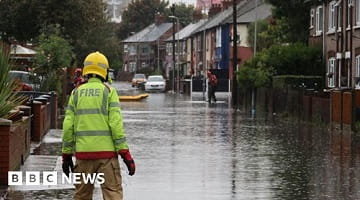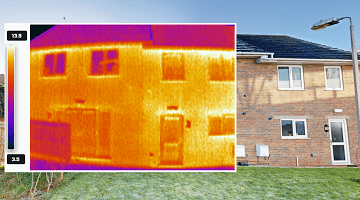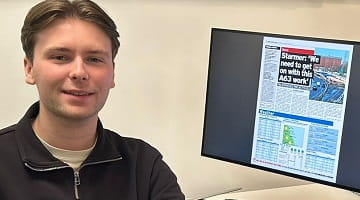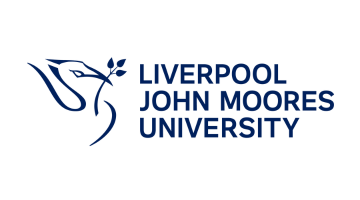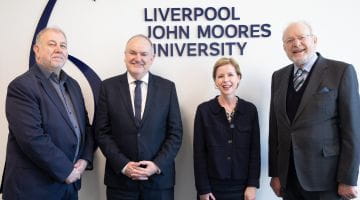Why study this course with LJMU?
- Excellent student support from academic tutors and student mentors
- Our application-led curriculum (designed in line with advice from industrial partners) emphasises an understanding of the concepts and theories that underpin technology as well as their application to real-world professional scenarios
- Teaching is supported by relevant laboratories and workshops (including recording, radio and television studios) with state-of-the-art software and excellent technical support
- Option to complete a validated year-long industrial placement (as part of the sandwich programme) or study a year abroad.
- International Foundation Year course available offering direct progression onto this degree programme - visit LJMU's International Study Centre to find out more
- LJMU ranked 15th university in the UK for general engineering degrees (The Times UK University Rankings 2025)
About your course
By studying BSc (Hons) Audio and Music Production at Liverpool John Moores University you will graduate with excellent technical skills plus the business management expertise required to succeed in this exciting industry.
Behind every live or studio performance lies a fascinating array of modern audio technology. This course gives you an opportunity to learn about the theories and concepts which underpin the use of this equipment, enabling you to work independently, solving practical problems and identifying solutions which help performers, producers and directors get the best results.
It is important to note that while this course includes some elements related to artistic matters, it is not primarily an arts-based course, though content creation by students does feature quite extensively within the framework as a means of underpinning and enhancing the development of understanding in the techniques and technical processes involved. Furthermore, students are expected to engage with other media production theories and techniques where audio plays only a part, albeit a significant one.
The advent of new computer-based technology has profoundly altered the way we create, capture and deliver audio content. In order to secure a career in the audio/music-related industries, you will need to gain and demonstrate the competence and confidence to work effectively with this technology.
Traditionally, purely technical graduates lack a business and management perspective. Similarly, media studies graduates often lack the necessary technical appreciation to work in this field. This programme bridges that gap and you will graduate not only with enhanced abilities in the operation of the specialist equipment deployed and with sound/music appreciation, but also the business management awareness to succeed in the audio/music production industry. Three strands (production; technology; management) run throughout the course, building knowledge at each level. (Despite the emphasis on the use of technology, applicants are not expected to have Level 3 qualifications rooted in subjects that would be pre-requisites in more traditional technology degrees and staff are familiar in dealing with students from a wide range of backgrounds.)
You will have access to state-of-the-art audio technology as well as staff with extensive knowledge and experience. You will develop skills in media technology, basic signal capture and storage, computer applications and studio technology and be trained in all aspects of creating live or recorded entertainment. Combined with the practical hands-on experience you will get if you choose to do a work placement, this will give you a significant advantage when it comes to securing your first job.
You will have access to industrially-relevant teaching facilities at the Byrom Street campus including a dedicated 'live' recording area, radio and television studios, recording booths and modern editing facilities.
Learn more about our degree course in this 3-minute video.
Additional course costs
Students are recommended to get their own headphones, portable disks and SD cards though these can all be provided by the department if required.
Course modules
What you will study on this degree
Further guidance on modules
Modules are designated core or optional in accordance with professional body requirements, as applicable, and LJMU’s Academic Framework Regulations. Whilst you are required to study core modules, optional modules provide you with an element of choice. Their availability may vary and will be subject to meeting minimum student numbers.
Where changes to modules are necessary these will be communicated as appropriate.
Core modules
Core modules
Optional modules
Core modules
Your Learning Experience
Excellent facilities and learning resources
We have sound and TV studios where you will practice your skills and develop understanding of the production process through teamwork in a completely realistic environment.
Teaching varies according to the module being studied but is mainly delivered through lectures supported by small-group tutorial work. There is an emphasis on interactive study through our virtual learning environment, Canvas, from which you can access online learning resources at any time and from anywhere.
Our Byrom Street campus, where this course is delivered, is engineered to assist you to success thanks to the investment of 6million in state-of-the-art teaching facilities.
Our contemporary computer suites provide access to high-performance computers, dedicated to students from our School. Teaching rooms are designed to enable the multimedia delivery of teaching materials and demonstrations.
Work-based Learning
This course offers an invaluable opportunity to undertake a sandwich year or placement working in the industry after your second year. This experience cannot be underestimated as it will give you a chance to put what you have learnt in the first two years into practice, enhance your skills and provide a taste of what its really like to work in the industry. It will also give you a head start when you come to negotiate your way around the competitive job market.
Dedicated personal tutor, plus study skills support
Like students on all degrees, you will need support during your course but particularly during the early stages. For this reason, you will be allocated a personal tutor with whom you can discuss course-related issues, work on a personal development plan and set your own targets. Small tutorial groups also provide a supportive environment in which to discuss ideas and issues more informally with your tutors and fellow students.
Assessment varies depending on the modules you choose, but will usually include a combination of exams and coursework.
Students' knowledge and understanding will usually be assessed via a combination of examinations and coursework. However, certain subjects may be assessed by other means, such as through a portfolio of work or practical work, for example. A final-year project gives you the chance to work independently and contributes considerably to your final mark. Your tutors will give prompt and constructive feedback via Canvas, face-to-face or in writing. This will help you to identify your strengths as well as the areas where you may need to put in more effort.
Where you will study
This programme is delivered in the Byrom Street complex of LJMUs City Campus. Here you'll find high quality lecture theatres, meeting and seminar rooms plus social spaces and a large café. The Avril Robarts Library is just minutes away on Tithebarn Street.


Excellent facilities and great staff. It's good to be in a small class as equipment is easy to borrow.
Career paths
The first group of students from the BSc Audio and Music Production degree graduated in 2011, with a number securing employment with high profile companies, including BBC Radio 4 and Sky, clearly demonstrating the calibre of both our students and the programme itself.
Since then graduates have continued this successful employment profile with companies such as Adlib, ITV, Bradford City Film, ADI tv, BBC, ITV, Channel 4, Bauer Media and various independent recording studios. One of graduates is a BAFTA-nominated and award-winning independent composer, producer and performer.
Graduate opportunities include working as sound engineers or in sound production working in television and radio companies, theatres, event venues and music recording studios. Many graduates have also started their own recording/production companies.
Student Futures - Careers, Employability and Enterprise Service
A wide range of opportunities and support is available to you, within and beyond your course, to ensure our students experience a transformation in their career trajectory. Every undergraduate curriculum includes Future Focus during Level 4, an e-learning resource and workshop designed to help you to develop your talents, passion and purpose.
Every student has access to Careers Zone 24/7, LJMU's suite of online Apps, resources and jobs board via the LJMU Student Futures website.
Tuition fees and funding
- Full-time per year:
- £9,535
- Placement year:
- £1,905
Fees
The fees quoted above cover registration, tuition, supervision, assessment and examinations as well as library membership and student IT support with access to printed, multimedia and digital resources including programme-appropriate software and on campus Wi-Fi.
Financial Support
The University offers a range of scholarships to support students through their studies. You'll find all the information you need on our specialist funding pages, including details of the Student Support Fund and other activities to support with the cost of living.
Additional Costs
In addition to fees, students should also keep in mind the cost of:
- Accommodation
- Travel costs including those for placements, visas and travel for studying abroad and field trips unless paid for by LJMU
- Stationery, IT equipment, professional body membership and graduation gown hire
The University reserves the right to increase tuition fees in accordance with any changes to the maximum allowable fees set by the UK Parliament. In the event of such a change, any fee increase will be subject to a maximum cap of 10% of the total course cost as originally stated at the time of your offer.
Entry requirements
Please choose your qualifications below to view requirements
Grades/points required from qualifications: BBC - ABB (112 - 128)
Work out how many UCAS points your qualifications are worth by visiting the UCAS Tariff Calculator.
Qualification requirements
How to apply
Securing your place at LJMU
UCAS is the official application route for our full-time undergraduate courses. Further information on the UCAS application process can be found here https://www.ljmu.ac.uk/study/undergraduate-students/how-to-apply.
We are looking for students who are keen to learn new skills and develop those they already possess. We want students with the ability to: be creative with ideas and concepts, moderate their creativity with logic, be enthusiastic and thirsty for knowledge, communicate effectively and confidently and understand and adapt to a wide range of issues connected with the subject.
It is also important that students are able to manage time and tasks effectively as an individual and as part of a team, use appropriate sources to find and organise information and select and critically evaluate information in order to analyse problems.
If you would like to develop these skills further, have a strong interest in this subject area and want to work effectively within it, then this is the course for you. International applications will be considered in line with UK qualifications.
Your university life
From accommodation and academic support to clubs and societies. Find out what LJMU has to offer.
Related Links
Talk to our students
Connect with a current LJMU student for advice and guidance on university life, courses and more.
See what our students are saying
At LJMU we want you to know you're making the right choice by studying with us. You can see what our students are saying about their experience with us through their reviews on the following websites:
Related Links
News and views
Browse through the latest news and stories from the university
The university reserves the right to withdraw or make alterations to a course and facilities if necessary; this may be because such changes are deemed to be beneficial to students, are minor in nature and unlikely to impact negatively upon students or become necessary due to circumstances beyond the control of the university. Where this does happen, the university operates a policy of consultation, advice and support to all enrolled students affected by the proposed change to their course or module.
Further information on the terms and conditions of any offer made, our admissions policy and the complaints and appeals process.























